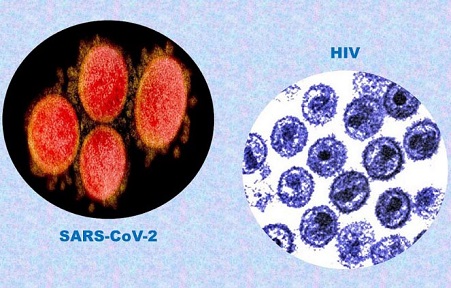Nikhil Prasad Fact checked by:Thailand Medical News Team Aug 19, 2024 1 year, 6 months, 1 week, 1 day, 15 hours, 6 minutes ago
Medical News: In recent years, the world has grappled with the far-reaching impacts of the COVID-19 pandemic, caused by the SARS-CoV-2 virus. Simultaneously, the HIV/AIDS pandemic continues to affect millions globally, with no cure yet discovered. For people living with HIV (PLWH), especially those on effective combination antiretroviral therapy (cART), concerns have emerged about how COVID-19 might influence the progression of HIV. Researchers from the Consejo Nacional de Investigaciones Científicas y Tecnológicas (CONICET) in Argentina, along with collaborators from the IRCCS San Raffaele Scientific Institute and Vita-Salute San Raffaele University in Italy, have embarked on a study to explore this very intersection. This
Medical News report delves into their findings, highlighting how SARS-CoV-2 might modulate HIV latency, a state where the virus lies dormant within infected cells.
 SARS-CoV-2 reactivates latent HIV and can influence HIV disease progression!
The Role of Macrophages in HIV Latency
SARS-CoV-2 reactivates latent HIV and can influence HIV disease progression!
The Role of Macrophages in HIV Latency
HIV latency remains one of the primary challenges in eradicating the virus from the body. The virus integrates its genetic material into the host’s DNA, residing in a dormant state within certain immune cells, particularly CD4+ T cells and macrophages. This latent reservoir is resistant to the body's immune response and antiretroviral therapies, making it a persistent obstacle to achieving a cure. Macrophages, a type of white blood cell, play a crucial role in this process. They can harbor HIV for extended periods, particularly in tissues such as the lungs, brain, and lymph nodes.
Researchers have long known that pro-inflammatory cytokines - molecules that signal and regulate immune responses - can reactivate latent HIV. These cytokines are often elevated in individuals infected with SARS-CoV-2, raising the possibility that COVID-19 could influence HIV latency in infected individuals.
Study Focus: Myeloid Cells and HIV Reactivation
The study focused on a specific type of myeloid cell, known as the U1 cell line. These cells, derived from human promonocytic U937 cells, are chronically infected with HIV-1 and serve as a model for studying HIV latency. By exposing these cells to SARS-CoV-2, the researchers sought to determine whether the virus could induce HIV reactivation.
Key Finding 1: SARS-CoV-2 Exposure Modestly Reactivates HIV
The researchers found that exposure of U1 cells to SARS-CoV-2, both the ancestral strain and the Omicron variant, did indeed result in modest HIV reactivation. However, this effect was not immediate and required prolonged exposure of at least 24 hours. The extent of reactivation was relatively low, with only a small percentage of cells showing signs of viral activity.
This finding suggests that while SARS-CoV-2 can induce HIV reactivation, it does so to a limited extent. The researchers hypothesize that the interaction between the SARS-CoV-2 spike protein and the ACE2 receptor on U1 cells may trigger a signaling cascade that leads to this modest reactivation.
/>
Key Finding 2: The Role of Macrophage Polarization
The study also explored how SARS-CoV-2 exposure affects macrophage polarization - a process where macrophages adopt different functional states, either pro-inflammatory (M1) or anti-inflammatory (M2). Upon short-term exposure to SARS-CoV-2, human monocyte-derived macrophages (MDMs) initially polarized towards the M1 phenotype, which is associated with pro-inflammatory activity. However, over time, these cells shifted towards the M2 phenotype, which is linked to tissue repair and anti-inflammatory responses.
Interestingly, the soluble factors released by M1-polarized macrophages were capable of reactivating HIV in U1 cells, albeit in a concentration-dependent manner. In contrast, factors released by M2-polarized macrophages had a much lower capacity to induce HIV reactivation. This shift from M1 to M2 polarization over time could explain the reduced HIV reactivation observed with prolonged SARS-CoV-2 exposure.
Key Finding 3: Impact of SARS-CoV-2 Variants
The study compared the effects of different SARS-CoV-2 variants on HIV reactivation. While both the ancestral strain and the Omicron variant were capable of inducing reactivation, there were subtle differences in the extent of their impact. The Omicron variant, for instance, showed slightly higher reactivation levels, though the differences were not statistically significant. This suggests that while the variant of SARS-CoV-2 may play a role, the overall mechanism of HIV reactivation remains consistent across different viral strains.
Conclusion: A Complex Interplay
The findings of this study underscore the complex interplay between SARS-CoV-2 and HIV in myeloid cells. While SARS-CoV-2 can indeed induce HIV reactivation, the extent of this effect is modest and heavily influenced by the duration of exposure and the polarization state of macrophages. The study suggests that SARS-CoV-2-induced systemic inflammation and the interaction with macrophages could influence proviral HIV-1 latency in myeloid cells in PLWH.
These findings carry significant implications for PLWH who contract COVID-19. The potential for SARS-CoV-2 to modulate HIV latency highlights the need for careful monitoring and management of co-infections in this vulnerable population. Furthermore, the study opens new avenues for research into the mechanisms underlying HIV latency and reactivation, particularly in the context of co-infections with other viruses.
As the world continues to grapple with the dual challenges of HIV and COVID-19, understanding how these viruses interact within the body will be crucial for developing effective treatment strategies.
The study findings were published in the peer-reviewed journal: Viruses.
https://www.mdpi.com/1999-4915/16/8/1310
For the latest on SARS-CoV-2 and HIV, keep on logging to Thailand
Medical News.
Read Also:
https://www.thailandmedical.news/news/breaking-hepatitis-b-uae-covid-19-case-study-indicates-that-covid-19-could-induce-hepatitis-b-virus-reactivation
https://www.thailandmedical.news/news/breaking-covid-19-news-sars-cov-2-hides-in-the-body-via-extracellular-vesicles-and-reactivates-later-while-constantly-testing-negative
